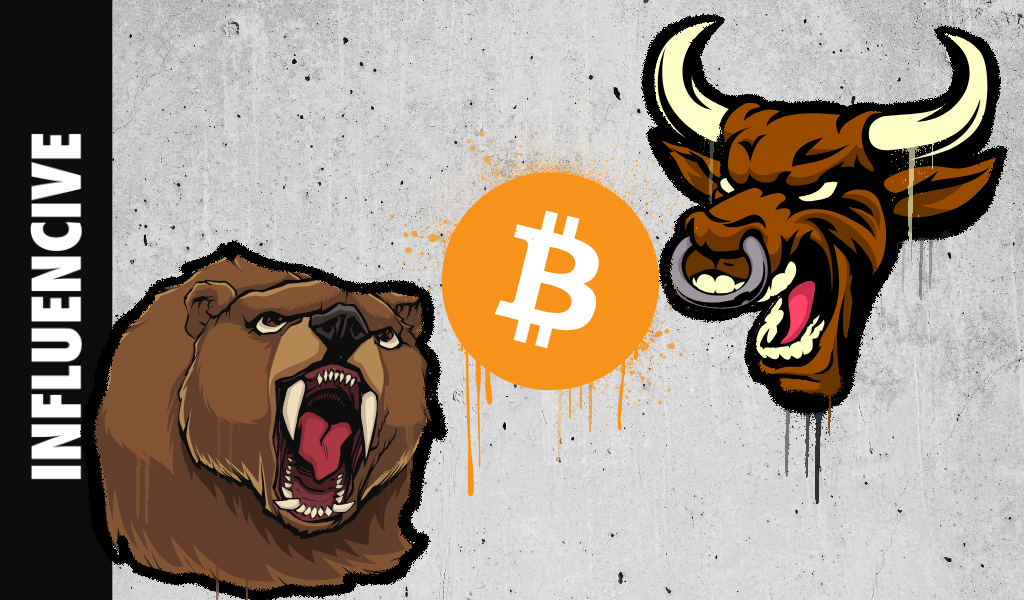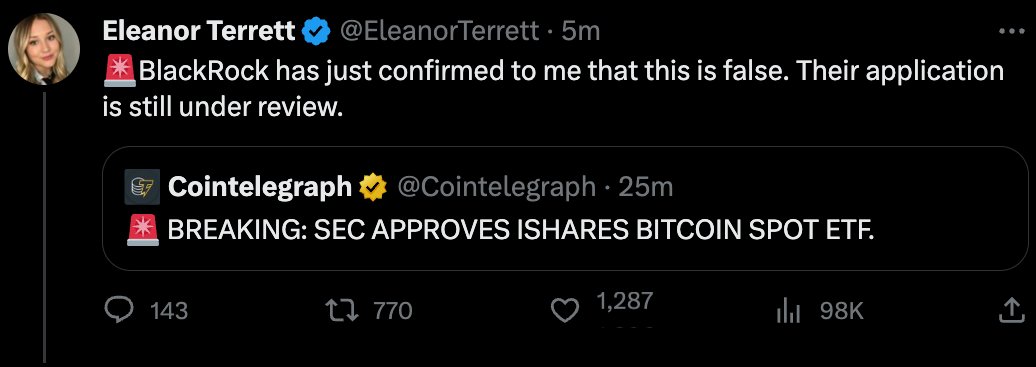A storm raged through Web3 yesterday when the popular media outlet, Cointelegraph, published an announcement claiming that the SEC had approved BlackRock’s Bitcoin ETF application. This news quickly spread like wildfire on social media, causing a frenzy of excitement among traders and investors who proceeded to FOMO in, as is tradition in such circumstances. Bitcoin’s price surged, temporarily reaching above $30,000, with other tokens experiencing quick and sharp price increases as well.
The FalsE Alarm
However, the celebration was short-lived. BlackRock promptly issued a statement denying the rumors and clarified that their ETF application was still under review by the SEC. This revelation sent shockwaves through the market, causing Bitcoin to plummet from its temporary high, but only to where it previously rested at around $27,500.
WhY Are People Excited About A BTC ETF?
An ETF, which stands for “Exchange-Traded Fund,” is a financial product designed to provide investors with exposure to the price movements of an asset without the need to directly own and manage the asset itself.
The primary advantage of a Bitcoin ETF would be that it will provide a regulated and more straightforward way for investors to gain exposure to the crypto market. It eliminates the need for investors to set up Web3 wallets, manage private keys, or navigate CEXs.
The reason why so many are getting excited about the prospect of a Bitcoin ETF, is because it would be advantageous for institutions to enter the market due to its regulated and convenient structure. Institutions often have strict compliance requirements, making direct crypto investments challenging. With a Bitcoin ETF, they can gain exposure to Bitcoin’s potential returns without the complexities of custody, security, and regulatory compliance. ETFs also provide liquidity, flexibility, and the ability to integrate Bitcoin investments into their existing portfolios.
The SEC Responds!
Careful what you read on the internet. The best source of information about the SEC is the SEC.
— U.S. Securities and Exchange Commission (@SECGov) October 16, 2023
In response to the false reports and the ensuing chaos, the SEC issued a stern warning on social media, emphasized the importance of relying on official sources for accurate and verified information. To give context, it’s said that CoinTelegraph published their announcement after an employee saw the rumor circulating in a Telegram channel.
Ok, So If Not now, “WEn?”
Despite the false alarm, the excitement surrounding Bitcoin ETFs remains palpable. Several major financial institutions, including BlackRock, Fidelity, and VanEck, are vying to launch their own spot Bitcoin ETFs.
Market experts project a 90% likelihood of a Bitcoin ETF receiving approval by January 10, 2024. The approval of a spot Bitcoin ETF could mark a monumental turning point in the Web3 industry, potentially paving the way for a surge in institutional investment across the board.
Final Thoughts
The recent false reports of a BlackRock Bitcoin ETF approval highlighted the crypto market’s vulnerability to news and speculation. This mistake did cause nearly $100 million of liquidations, which is not great by any means. However, it’s essential to recognize that this susceptibility is not unique to the cryptocurrency space.
Consider the GameStop phenomenon, where investors experienced market manipulation when trading was halted, preventing retail from selling their shares while the price slowly dropped with them powerless to do anything.
We could even delve into the uncanny stock selections of certain members of Congress who almost appear to possess the prophetic abilities of Nostradamus. Their impeccably timed stock picks, occurring mere weeks before significant global events, have certainly raised more than a few eyebrows.
Despite such events, many investors continue to participate in the stock market without deterrence. BlackRock’s CEO, Larry Fink, certainly appears to be unbothered, if yesterday’s interview was anything to go by:
$10 trillion BlackRock CEO on FOX: Today's rally is "way beyond the rumor" of a spot #Bitcoin ETF approval.
"It's about a flight to quality" pic.twitter.com/BLit5DcPmt
— Bitcoin Magazine (@BitcoinMagazine) October 16, 2023
Opinions expressed here are opinions of the Author. Influencive does not endorse or review brands mentioned; does not and cannot investigate relationships with brands, products, and people mentioned and is up to the Author to disclose. Accounts and articles may be professional fee-based.


